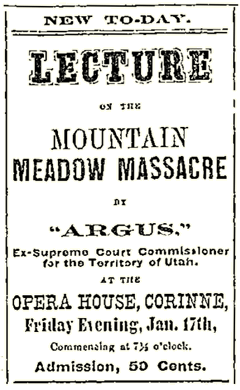
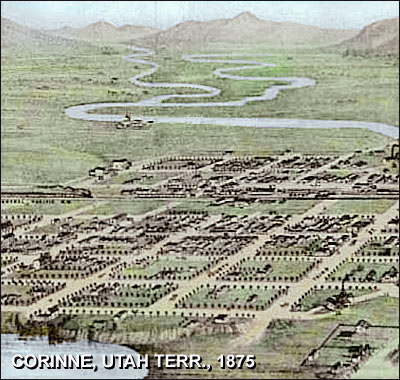
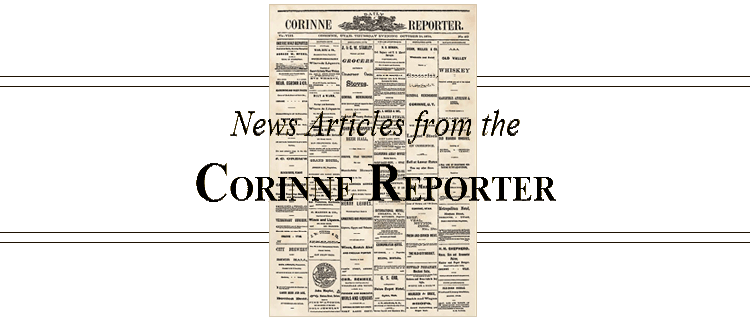
Reporter issues published in Great Salt Lake City
(May 1868-Apr. 1869)
Reporter issues published in Corinne
(Apr. 1869-Dec. 1870)
Reporter issues published in Corinne
(Jan.-Dec. 1871)
02 11 '71w | 02 22 '71 | 03 27 '71 | 04 22 '71w | 05 05 '71 | 06 03 '71 | 06 09 '71 | 06 10 '71 | 06 15 '71 | 07 15 '71w
07 22 '71w | 07 29 '71 | 08 01 '71 | 08 05 '71w | 08 12 '71w | 08 19 '71w | 08 26 '71w | 08 28 '71 | 08 31 '71 | 09 01 '71
09 02 '71 | 09 06 '71 | 09 08 '71 | 09 09 '71 | 09 16 '71 | 09 23 '71 | 09 30 '71 | 10 07 '71 | 10 14 '71 | 10 19 '71
10 24 '71
(1872-1873)
04 15 '72 | 04 25 '72 | 09 14 '72 | 09 16 '72 | 09 20 '72 | 09 23 '72 | 09 24 '72 | 09 27 '72 | 01 16 '73 | 01 17 '73
01 18 '73
Salt Lake Union Vedette | Cincinnati Commercial | Salt Lake Tribune | Mountain Meadows
Library Home Page | J. H. Beadle Biographical Sketches | Reporting About J. H. Beadle
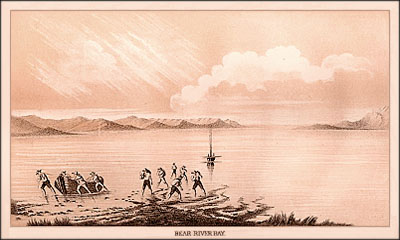
 Vol. ? Corinne, U. T., Saturday, February 11, 1871. No. ?
Lee and the Mountain Meadows Massacre.
|
 Vol. III. Corinne, U. T., Wednesday, February 22, 1871. No. ?
Mountain Meadows.
|
 Vol. III. Corinne, U. T., Monday, March 27, 1871. No. ?
CORINNE.
...From Cheyenne the road climbs rapidly and soon enters on a grand pass through the Rocky Mountains, 200 miles wide by 500 long, having an average elevation of 7,000 feet, almost totally destitute of vegetable life, with good water only at intervals of a hundred miles or so, where the Laramie, Platte, Green and Bear rivers cross it, but abounding good combustible coal. From the route in places may be seen the blue mountains in the far horizon. These are principally the Medicine Bow and Uintah on the south and the Wind River on the north. |
 Vol. ? Corinne, U. T., Saturday, April 22, 1871. No. ? The Alger Reduction Works. This morning the work of laying the foundations for the Alger Reduction Works of Corinne was commeuced, on Arizona street, near Second, by Gen. Jos. J. Hefferman and George W. Goff, and they will not delay a moment in preparing the furnaces for active operitions. These gentlemen arrived here from the East on last Friday evening to look around and see the ''lay of the land," and already do we find them occupying their own dwelling, and now engaged in the greatest enterprise yet started in our city. We wish them all the success which their energy deserves, and hope to be able to give frequent reports of the precious metals wrought out in their works -- the pioneer silver shops of our city. In a day or two we expect the favor of obtaining from Gen. Hefferman the plans of his buildings and grounds, so as to be able to lay a complete description of the Alger Reduction Works before our readers. Miners at Ophir as well as here in our own vicinity, will rejoice that the ore market, so long wished for, is opening at their doors. The good time, as foretold by the prophet Stein, is very near with its |
 Vol. III. Corinne, U. T., Friday, May 5, 1871. No. 132. The Press in Court. As many as five indictments have been reported by the Grand Jury at San Francisco against the Daily Chronicle, and one against the Alta, charging those journals with the offense of libel. The mission of the newspaper is one that is limIted only by the decency and good judgment of the editor; but in his criticism of the acts of public men and measures, it often happens that vituperation is substituted for just censure and admonition. In the case of the Chronicle we are inclined to believe that, while the jury were governed wholly by the ex parte of the prosecutlng witnesses, and thus compelled to indict, their inquest is, however, poorly employed in the [prosecution] of that journal for libel so far as is itt is affected by the paper's antmadversions on the conduct of Sinton, at whose instance the first indictment is found. He was a publlc officer, the Chronicle a public agent and by the obligations existing between the press and people, was bound to make note of what is deemed wrong. Our recollection of the matter published is, that it went no further than that; and if it be the intention of Courts to muzzle this style of criticisinng the acts of officials, the change will be unfortanate in the extreme. The right of the people to talk of malpractice or ma;administration in their own affairs has always been among the "inalienable" privileges, and we hope it will ever remain in that category. If newspapers are to be circumscribed to the narrow limit laid down in San Francisco, it would be as well to say that the press is no longer free to act with its mighty leverage to aid of the public welfare. |
 Vol. IV. Corinne, U. T., Saturday, June 3, 1871. No. 3.
The steam wagon drew well today, it drew a big crowd of spectators... Early last evening the great steam wagon of the Corinne line to Southern Utah arrived from the west on the freight train. It is a wonder of strength and ingenuity and has already been tried as to capacity for hauling. It is now here awaiting the steamboat to carry it across Great Salt Lake to the roads leading toward the mines. A commencement of the vast enterprise of making steam thoroughfares of all the common roads in Utah. Col. Hyde & W. W. Hanscom, the builder, goes to Salt Lake City, to-day, with this useful wonder, and after showing it to the inhabitants of that place will return and ship it to Lake Point, by the steamboat, City of Corinne. |
 Vol. IV. Corinne, U. T., Friday, June 9, 1871. No. 8.
The Steam Wagon.
Colonel Hyde's grand triumph, the steam wagon or road locomotive, was all around town to-day. At eleven o'clock it started across the track, bounding over hedges and ditches, then up on the north side, where it was guided over toward the water works to drink. Several hundred gallons of Hiram's tank sufficed to slake the monsters thirst, and away it went again. We have described this consolidation of mule horse, and ox teams before but did not see its capering movements until this morning. Why, it appears to swing around in the road, at command of the steering apparatus, easier than a man could turn a wheelbarrow on a matched floor! This great engine will draw its thirty or forty tons of freight in wagons as readily as it moves unloaded. Mr. Hanscom, builder of the car, acted as pilot to-day, and surely his pride as a mechanic must have been fully satisfied in the wonderful work of the Overland Steamer. It is the king of the road in every way. In twenty feet in turns completely around, going at its speed, stops with the touch of a valve, and when desired to move on, takes up its march with a step that ordinary obstructions cannot retard. On the next trip of the steamer, this steam wagon is to be taken across the lake by Colonel Hyde, and there put to hauling ores and freights from the mines to the landing. We rejoice greatly in its success to-day, and while seated on its steady front, close by Mr. Hanscom, wished the glory of inventing and matiufacturing so useful a machine would sometime be ours. |
 Vol. IV. Corinne, U. T., Saturday, June 10, 1871. No. 9.
The steam wagon has arrived from Salt Lake City, where it has been giving practical tests of its powers. It goes to Lake Point from here to haul ores from the mines to the steamboat landing. From the boat it crawled its way to land over the shaky wharf with the same caution that any other elephant would. It was there loaded with lumber and coal, for bridges and fuel on a train of six wagons, one of iron entirely, the others ordinary freight wagons. The progress of the steamer to Tooelle and Stockton and its return with a load of ore and bullion are best given from Mr. Hanscom's diary notes taken on the trip. The greatest difficulty experienced was in the supply of water obtainable on the road, some of which could not bo kept in the boiler on account of its effervescing so much. It became necessary to blow out the water several times when they could get better to fill up with. The tanks carried 300 gallons, which will supply 20-horse power four hours, with a consumption of five pounds of coal per horse power per hour. |
 Vol. IV. Corinne, U. T., Thursday, June 15, 1871. No. 9.
Her [The steanboat City of Corinne] length overall is 130 feet, beam 28 feet, depth of hold 7 feet, tonnage 300 tons, and has passenger accommodations for 150 persons. She is provided with fifteen-inch cylinder engines of four and a half feet stroke, manufactured by Girard B. Allen & Co., St. Louis. She also contains a water tank capacity of 14,000 gallons, to supply water for her boilers, which consist of two flue boilers, forty inches in diameter and twenty four feet long. |
 Vol. ? Corinne, U. T., Saturday, July 15, 1871. No. ?
Argus' Letters. During a recent visit to Salt Lake City, we made arrangements for a continuance of the writings of this able correspondent and thoroughly versed historian of Utah. To-day (Saturday) the first of the new series of "Open Letters to Brigham Young" appears, and hereafter one each week until the completest history of Mormonism ever yet written, shall have been given to the world. There are only two men, living, capable of accomplishing the task of "Argus," namely, himself and Brigham Young. The latter dare not write the fearful autobiography, but the other meets the responsibility with a candor that is terrible to contemplate. |
 Vol. ? Corinne, U. T., Saturday, July 22, 1871. No. ?
HISTORY OF MORMONISM.
|
 Vol. IV. Corinne, U. T., Saturday, July 29, 1871. No. ?
HISTORY OF MORMONISM.
|
 Vol. IV. Corinne, U. T., Tuesday, August 1, 1871. No. ?
A skeleton, exhumed from the ground at Corinne, July 25th, has created a sensation among the people here... Dr. Munckton, principal owner of the Danderberg mine, at Carson, Nev., is arranging to put the mine up at a grand lottery.... The first twenty miles of the Utah Southern Railroad is located and let. The contractor's work is going ahead as fast as possible.... R. O. Bailey, of Montana, on yesterday purchased several hundred head of cattle from our fellow-citizen, Alex. Toponce. |
 Vol. ? Corinne, U. T., Saturday, August 5, 1871. No. ?
HISTORY OF MORMONISM.
Closing Scenes at the Mountain Meadow Massacre -- The Crowning Horror -- The Bodies of the Female Victims Stripped Naked and Left Lying in the Sun -- Two More Children Murdered -- What Became of the Spoils -- Meeting of the Executioner and the Plotter -- The Grief of Brigham Over the News -- Lee Gloating Over the Massacre -- He is Rewarded for His Bravery by Four Additional "Wives" -- A Summing Up -- The Crime Fixed, Etc. |
 Vol. ? Corinne, U. T., Saturday, August 12, 1871. No. ?
HISTORY OF MORMONISM.
The Object of These Letters -- Cause of the Mormon Exodus from Illinois -- Brigham’s “Policy” -- The Meshes of Polygamy Pervert the Mind of the Prophet -- His Minute Preparations for the Diabolical Massacre -- The Precautions to Prevent an Escape from the Bloody Scene -- The Arch Fiend Covered with Evidence -- Etc. |
 Vol. ? Corinne, U. T., Saturday, August 19, 1871. No. ?
HISTORY OF MORMONISM. Brigham Young’s Indifference to the Mountain Meadow Massacre -- His Army of Defense -- Appeal to the Proper Authorities to Investigate the Massacre -- The Guilty Should be Exposed and Punished -- Etc. |
 Vol. ? Corinne, U. T., Saturday, August 26, 1871. No. ?
HISTORY OF MORMONISM.
|
 Vol. IV. Corinne, U. T., Monday, August 28, 1871. No. 73. MR. GODBE AND POLYGAMY. The Chicago Tribune is ventilating polygamy by the light which Mr. William S. Godbe is shedding upon it. This does not remind us of a little story, but it does recall a little fact, to this effect: |
 Vol. IV. Corinne, U. T., Thursday, August 31, 1871. No. 76.
JOTTINGS ABOUT TOWN.
...O. J. Hollister returned from his trip south on yesterday's train.... |
 Vol. IV. Corinne, U. T., Friday, September 1, 1871. No. 77.
BE IMPARTIAL. The Salt Lake Review is doing heavy battle against one wing of the Mormon despotism. It goes strongly and with well whettled blades for Young and his cohorts, right before the citadel of their strength. So far, all right; but the Review should not confine its warfare to raids and forays of the prophet. [There are] just as bad as Brigham, who assume the role of "rats deserting the sinking ship," but if assured that the old craft of treason and polygamy could, with impunity, mount the billows of the law, would spring to their waiting places with fiendish joy. Brigham Young, we know to be a libertine, but it cannot be said that he ever denied that imputation. He keeps his concubines in Utah, which may be no special credit to our Grand Turk, for here it is unlawful; and that should be reason enough to end the nefarious business. But there be other Mormons who pretend to an apostacy from the faith, who cling to polygamy as a dogma of religious belief, and when their women are spoken of by proper titles, take high offense because concubinage is not classed with virtue. This class does not, like Young, tacitly plead guilty to the charge of libertinism, but with sensitive pertinacity tell the world to let them alone in their crime. Of these is Godbe, the aspirant of leadership in a usurpation of dominion over Israel, who goes beyond the confines of Utah to find dwelling for some of his strumpets in some of the Eastern States, and probably force them into contact in society with honorable women, in pure christian society. His contingent at home are no less exempt from the scorn of the press and legal punishment than the same class of females in the service of Young. When the master walks up to the scaffold, or is borne to the penitentiary, we shall expect to see in file with him, those of the New Movement who are not formally accepted as "states evidence" against their principals. For except they be so employed, it will be a most ingenious task, to prove them innocent, who, had for many years endorsed every act, good and bad, of Brigham Young. An attempt to shield a few, and cover others where the gravamen of the complaint is too fine for severance, will only show that we are unfair, prejudiced and unjust judges of our neighbors. The balance should be adjusted with nicety, and no partiality shown. If Brigham Young, Cannon and Wells, and the rest are libertines because they keep lewd women, then surely are Godbe, Kelsey and the other harlot-owners of the feigned schism as well, if not more, entitled to reprobation. These latter are of the eternal priesthood, and were participants in all the wrongs which their creed has put upon the people. They know the secrets better than Rockwell or Lee, and should be made to divulge or else go with their co-transgressors. It is only in this way that we would see Mormonism denuded, not by passively ignoring its most dangerous part while it hatched new venom and more deadly poisons. The Review is making vigorous thrusts, but unless it hurls blows with equal violence at all the law-breakers alike, the effort is useless. The devil of Brighamism is just as honest a demon as the devil of Godbeism in its hypocritical garments. Not the slightest difference between them, and if there should be, the original must be best. |
 Vol. IV. Corinne, U. T., Saturday, September 2, 1871. No. 78.
HISTORY OF MORMONISM.
|
 Vol. IV. Corinne, U. T., Wednesday, September 6, 1871. No. 81.
A QUESTION.
When the Utah Northern Railroad shall have been completed, we hear that all the freights and passengers to Montana, Northern Oregon, British America and Alaska, are to be switched off at Ogden, and taken on the narrow-gauge, via Soda Springs, to any gicen point on the globe, and no questions asked. California tourists are to go by that route, and by way of Helena and Puget's Sound, taking their baggage the same way. There will be no more use of the Central Pacific, and the towns along that line, being deprived of their business and resources, will have to retire, perhaps. Corinne is to be deserted by her patrons from the surrounding counties, the stage coaches must be withdrawn to ply from the new Eden on the upper Bear; fast and slow, the Diamond Ride to go back a hundred miles; and there is some talk of the lake overflowing this valley to an indefinite depth. That would be a small misfortune compared to some of the others, for our navy then might vie with Brigham's rails. If the land continues to remain above the wave we shall have nothing left, but the regrets of the past and our surplus cash. But, closing, let us ask the reader: Supposing the Soda Springs railroad finished to-day, or next year, what then? Try and answer this, some one. |
 Vol. IV. Corinne, U. T., Friday, September 8, 1871. No. 83.
A TRUE PICTURE. Reverend T. Dewitt Talmadge, a distibguished Christian minister of Brooklyn, New York, has been in Salt Lake City, and from there sent some graphic pen-pictures to the Independent. It is so seldom that tourists take the trouble of looking at any thing besides the rippling streams along the streets and the granite foundations of the Temple, that one is refreshed at reading from correct reports as in the case before us. For instance when the writer surveys the ground in this style: |
 Vol. IV. Corinne, U. T., Saturday, September 9, 1871. No. 84.
HISTORY OF MORMONISM.
|
 Vol. IV. Corinne, U. T., Saturday, September 16, 1871. No. 90.
HISTORY OF MORMONISM. The Crime of Murder Defined for Brigham -- The "Cutting Off" of Haight and Lee from the Church -- Why it was Done -- Brigham Fears the Arch-Fiends of the Mountain Meadows Massacre -- The Prophet as the Very Embodiment of Hypocrisy -- The Head of the Mormon Church Openly Charged with Murder -- The Modern "Macbeth" -- Etc. |
 Vol. IV. Corinne, U. T., Saturday, September 23, 1871. No. 96.
HISTORY OF MORMONISM.
|
 Vol. IV. Corinne, U. T., Saturday, September 30, 1871. No. 102.
HISTORY OF MORMONISM.
|
 Vol. IV. Corinne, U. T., Saturday, October 7, 1871. No. 108.
HISTORY OF MORMONISM.
|
 Vol. IV. Corinne, U. T., Saturday, October 14, 1871. No. 114.
HISTORY OF MORMONISM.
|
 Vol. IV. Corinne, U. T., Thursday, October 19, 1871. No. 118.
“ARGUS” LETTERS. The Corinne Reporter has a contributor who signs himself "Argus," who for some months has occasionally discussed the Mormon question with a candor unusual, and a vim and force more effective than often displayed by either party on this exciting topic. This apostate Mormon, for such he evidently is, has given Brigham Young's dynasty some of the most telling blows it has ever received. -- |
 Vol. IV. Corinne, U. T., Tuesday, October 24, 1871. No. 122.
ONE OF THE PROPHET'S ADMIRERS. The effusions of a Mormon sympathizer are admitted to the columns of the New York Tribune over the nom de plume of "Fair Dealing," which assume such an arregant positiveness that the reader is led to believe that all the fiends have conspired against that good and noble (God save the mark!) old polygamist and moribund ecclesiast, Prophet of the Church of Jesus Christ of Latter-end Saints. But the American people are too well informed of the heinous crimes and offenses against the laws of the land by the Mormon leaders to allow such a bold advocate of sin and corruption to make an impression on their minds. Mormonism looks well enough with a sugar-coating, but strip it of its thin crust of deception and it stands out like a bold promontory of iniquity, so black that the night of Erebus would be turned into day beside it. If the writer alluded to ever enjoyed the conversation of United States Judges in Utah, as he asserts he did, he performed the duty of a spy in the interests of his master, Brigham Young. He lies when he says the present proceedings are instigated against Brigham Young and his disciples through prejudice and bigotry; he lies when he says the Mormon leaders have been peaceable and friendly to those not of their faith; he lies when he says the Mormons lolerate no dramshops and no houses of ill-fame; he lies when he says the Gentiles have come hither to root out the Mormons, to put down competition in business; he lies when he says religious prejudice, bigotry and persecution are wrongfully brought against them to mislead the people of the East; he lies most damnably when he asserts that Brigham Young. Jr.'s speech before the last Mormon Conference was not incendiary, and he makes an egregious ass of himself by intimating that President Grant has [given] the motive power to the present judicial proceedings in Utah for the purpose of [gaining] additional laurels to advance his interests in the next Presidential campaign. While nothing is probably further from the President's purpose, he will certainly endear himself still more in the hearts of the American people by encouraging the execution of the laws so that the greatest criminals of the age may be brought to justice. It will not benefit Brigham Young one iota for his emissaries to seek to turn the current public opinion. The fiat of Christianity has gone forth, and polygamy must be exterminated, no matter whether the streets of Salt Lake City be bathed in the blood of its defenders, and their opponents alike, or otherwise. |
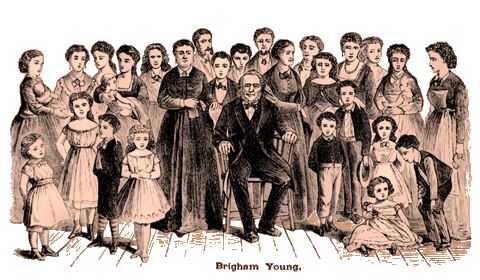
 Vol. V. Corinne, U. T., Monday, April 15, 1872. No. ?
Telegraphic...
|
 Vol. V. Corinne, U. T., Thursday, April 25, 1872. No. 124.
REMINISCENCE OF BEADLE.
From the interview between the reporter of the New York Times and J. H. Beadle, we clip the following little unpleasantness which occurred at our county seat a few years ago: |
 Vol. V. Corinne, U. T., Saturday, September 14, 1872. No. 244.
Telegraphic... New York, Sept. 14. -- The fact that the Mountain Meadow Massacre was Mormon work, is fully confessed in an affidavit of Philip Klingen Smith, now of Lincoln county, Nevada. Smith says [he], at the time a Mormon bishop, at Cedar City, Utah, was forced to muster with a militia regiment, perpetrating the crime, that the assailed party, after four days fight, were induced to lay down their arms under promise of protection, after which all were shot down by the Mormon militia, except seventeen young children who were taken in charge by Smith and saved. The affidavit gives particulars and carries conviction to its truth. |
 Vol. V. Corinne, U. T., Monday, September 16, 1872. No. 245.
THE MORMON PRESS
Whenever a Mormon falls from grace, which means a denial of the royal authority of Brigham Young, that moment the recusant is cut off, root and branch, as an apostate fore-ordained from the beginning to eternal perdition no less than mortal disgrace. To refuse to pay tithing into the coffers of ecclesiastical piracy is the unpardonable sun: far more so than to dispute the sangunary decrees of Blood Atonement. Depleting the treasures of the Church by contumacy in not pouring in the annual tenth of a man's net profits, sends out the anathemas of Zion; but when, occasionally, the dupe whose hands are gory in innocent blood shed by "divine" orders, repents his dreadful career by wholesome confession, then do all the curses of Danite theology find condemning speech to crush the penitent in his remorse, lest revelations of too worldly a character throw dangerous light on the dread secrets of Latter Dayism. Hence we find the Salt Lake Herald -- the Janus-faced organ of the Church -- in yesterday's issue making use of its choicest style of hypocrisy. The man Smith, who went into the slaughter at Mountain Meadow, was a priest of God, obedient to "counsel" when that crime of the century was perpetrated at the command of his then chief; but behold now the sanctimonious elder attempts to impeach the witness whose testimony comes up from the vale of murder! The Herald assumes a desire to bring Smith to Utah, in order that his declaration may be put to the test of corroborative evidence, so that "the Mormons, as a people," may not be charged with the crime. This is shallow. The Mormons, as a people, are not charged with the unparallelled massacre, but the Church of Jesus Christ of Latter Day Saints, as impersonated by Brigham Young, and his Apostles, did through them make the sacrifice of more than one hundred and twenty human lives, showing no mercy to its victims. The witnesses are hurrying in, of whom Smith is one, but, as many of those will soon appear; we shall now quote the Herald's comments which may be stereotyped for use in the cases of all others who are to follow, seeking amnesty from God and man, under the plea of "Guilty." |
 Vol. V. Corinne, U. T., Friday, September 20, 1872. No. 249.
MOUNTAIN MEADOWS MASSACRE. We give below the affidavit of Philip KlingonSmith one of the bishops who obeyed the orders of Brigham in the butchery of Mountain Meadows. The fearful story requires no comment, nor does it admit of a doubt. |
 Vol. V. Corinne, U. T., Monday, September 23, 1872. No. 251.
“MURDER MOST FOUL” If we may believe the sworn affidavit of a Mormon who claims to have participated in the Mountain Meadows massacre, says the New York "Tribune" of the 11th instant, the well settled suspicion that that dreadful deed was the work of the Mormons is now an established fact. Bishop Philip K. Smith of the Mormon Church swears that the immigrants slain at Mountain Meadows were not killed by Indians, as reported by the Mormons, but by the Mormon militia, who were called out for that purpose. His affidavit which we publish to-day, explicitly details the particulars of this frightful affair, all of which he saw while he was in the ranks. Few people familiar with the history of those times have ever doubted that the Mormons were guilty of that massacre; and the testimony of Bishop Smith confirms the belief of those who long ago set up on the bloody spot where the immigrants perished a monument bearing the significant legend -- "Vengeance is mine; I will repay, saith the Lord." |
 Vol. V. Corinne, U. T., Tuesday, September 24, 1872. No. 252.
MOUNTAIN MEADOWS MASSACRE. We give below the affidavit of Philip Klingon Smith one of the bishops who obeyed the orders of Brigham in the butchery of Mountain Meadows. The fearful story requires no comment, nor does it admit of a doubt... |
 Vol. V. Corinne, U. T., Friday, September 27, 1872. No. 255.
Telegraphic... A correspondent of the Pioche Record endorses Philip K. Smith being formerly bishop of the Mormon Church, and says he is ready to return to Utah and give testimony in person relative to the Mountain Meadow atrocity. |

"ARGUS" -- Charles W. Wandell (1819-1875)
 Vol. VI. Corinne, U. T., Thursday, January 16, 1873. No. 13.
JOTTINGS ABOUT TOWN. The event of the week is the coming lecture of "Argus" on the awful tragedy of Mountain Meadows.... |
 Vol. VI. Corinne, U. T., Friday, January 17, 1873. No. 14.
MOUNTAIN MEADOW. -- When it is known that "Argus" is to speak at the Opera House on the subject of the Mountain Meadow Massacre, that is enough to fill the house with auditors. To-night is the time to listen to the story of the Blood Atonement. Go and hear "Argus." |
 Vol. VI. Corinne, U. T., Saturday, January 18, 1873. No. 15.
ED. REPORTER -- Permit me through the columns of your paper, to assure the Salt Lake "Herald" man, that in my lecture last night in Corinne, I did "touch the meat question" -- the most slaughtered at the Mountain Meadows by the butchers of Brigham Young, the governor of Utah. |
Back to top of this page
Smith's History Vault | Cowdery's Bookshelf | Spalding Library | Mormon Classics | Newspapers
HOME unOFFICIAL JOSEPH SMITH HOME PAGE CHRONOLOGY
last updated: Apr. 21, 2014
